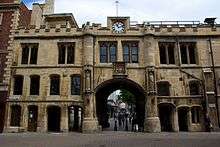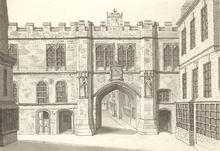Guildhall and Stonebow Lincoln
The Guildhall and Stonebow, Lincoln has been the meeting place of the Lincoln City Council from Medieval times to the present. The term ‘‘Stonebow’’ indicates a stone archway that visitors entering the city from the south, along the High Street, would have passed through. The present building was completed around 1520, but has been subject to alterations in about 1840 and in 1885-90.[1]
Architecture


The Stonebow is built from the local limestone. The exterior has crenellated parapets on both sides. South front has a roll moulded segmental central arch flanked by single round buttresses with canopied niches containing figures. Above, a tablet with pilaster surround with the arms of James I, and above again, two 2-light mullioned windows. Over them, there is a stepped gable containing a clock. On either side of the main arch there are two walkway arches, those to the right original, with hoodmoulds.
The North side has a plainer central arch, flanked by a single walkway arch to left and 2 to the right. Over the inner archways, small 2-light windows. Above, three 2-light pointed arched windows and parapet gable with clock.[2]
Alterations about 1840 and 1885-90.
Sometime about 1840 the Lincoln architect W A Nicholson made extensive alterations to the east end of the Stonebow, when the building that housed the old City prison was pulled down.[3][4][5] Nicholson observed that the Roman wall of the Lower Colonia in Lincoln was to the North of the Stonebow and was still standing to the height of about 15 feet. This suggests that the Stonebow was a Barbican, that had been built forward of the Roman southern gateway. Nicholson appears to have been the architect responsible for the present building to the east of the Stonebow completed about 1844 which now contains the Mayor's Parlour and the display of Civic regalia. Further alterations took place 1885-90 by the architect J. L.Pearson, who was responsible for alterations on the west side of the Stonebow. Pearson created an additional passageway arch and the shop units under the arch.[6]
The Guildhall Interior
.jpg)
.jpg)
The interior of the guildhall has the council chamber on the first floor, which has a strutted king post roof with arch braces to the purlins in the outer bays. The tie beams have bosses. There is mid-18th. century panelling with the arms of George II, which set behind the Mayor’s chair, below a segmental pediment on Corinthian columns.[7] Possibly the most impressive feature is the wide table around which the councillors sit. As the size of the council has been increased in recent years, additional seating has had to be added at the east end. The council is summoned to its meeting by the motte bell which dates from the 14th century.
Gallery
 Stonebow, Lincoln, c1890
Stonebow, Lincoln, c1890 Stonebow and Guildhall, 2013 with Mayor’s Parlour to left.
Stonebow and Guildhall, 2013 with Mayor’s Parlour to left.- Lincoln Guildhall Coat of arms
 Guildhall and Stonebow, North side
Guildhall and Stonebow, North side Stonebow, Lincoln. Mayor's chair with Canopy and Arms of George II
Stonebow, Lincoln. Mayor's chair with Canopy and Arms of George II- Stonebow, Lincoln. Early 18th century staircase leading to the Council Chamber.
 Stonebow, Lincoln. Medieval carved corbel on roof truss in Council Chamber.
Stonebow, Lincoln. Medieval carved corbel on roof truss in Council Chamber. Stonebow, Lincoln. Medieval carved corbel on roof truss in Council Chamber.
Stonebow, Lincoln. Medieval carved corbel on roof truss in Council Chamber.
Literature
- Antram N (revised), Pevsner N & Harris J, (1989), The Buildings of England: Lincolnshire, Yale University Press. pp 508–9.
- Nicholson W. A. (1841-2) ‘‘The Advantage of Recording the Discovery of Local Antiquities’’ in A selection of Papers relative to the County of Lincoln read before the Lincolnshire Topographical Society, pp89–90.
References
- ↑ "Antram", (1989) 503.
- ↑ British Listed Buildings
- ↑ W. A. Nicholson, (1841-2) "The Advantage of Recording the Discovery of Local Antiquities in ' A Selection of Papers relative to the County of Lincoln read before the Lincoln Topographical Society' pp89-9
- ↑ W. A. Nicholson, (1841-2) "The Advantage of Recording the Discovery of Local Antiquities in ' A Selection of Papers relative to the County of Lincoln read before the Lincoln Topographical Society' pp89-9
- ↑ Hill JWF (1955) Georgian Lincoln, CUP, 6-7
- ↑ "Antram",(1989), 503
- ↑ "Antram", (1989) 503.
External links
| Wikimedia Commons has media related to Lincoln Guildhall and Stonebow. |
Coordinates: 53°13′45″N 0°32′26″W / 53.2292°N 0.5405°W